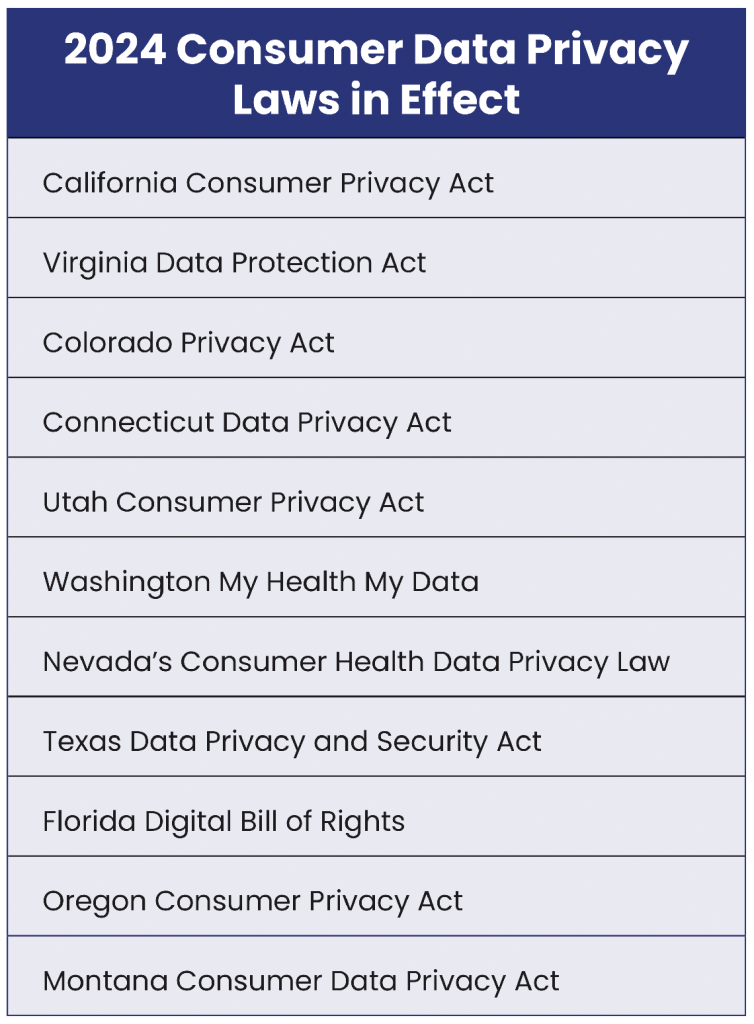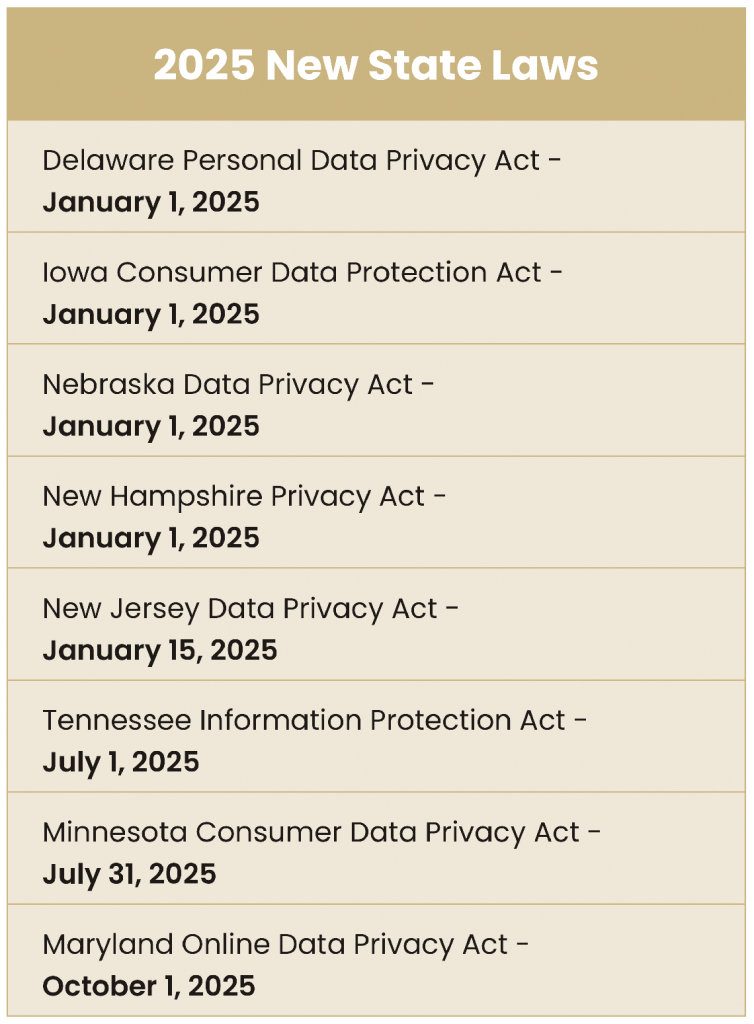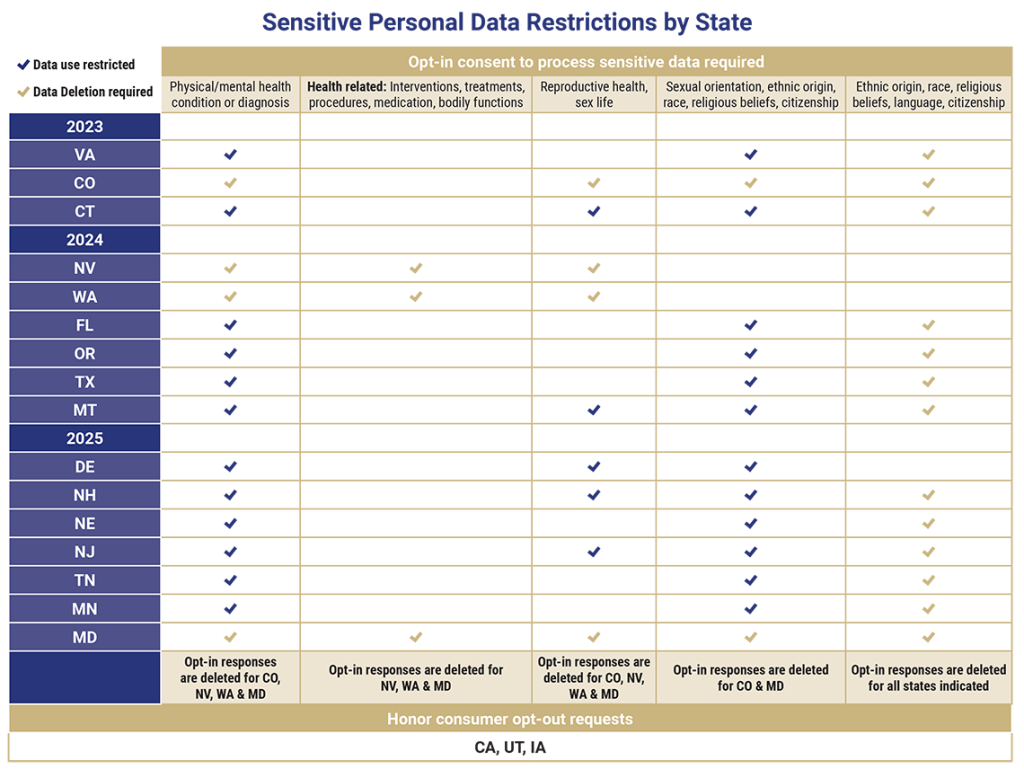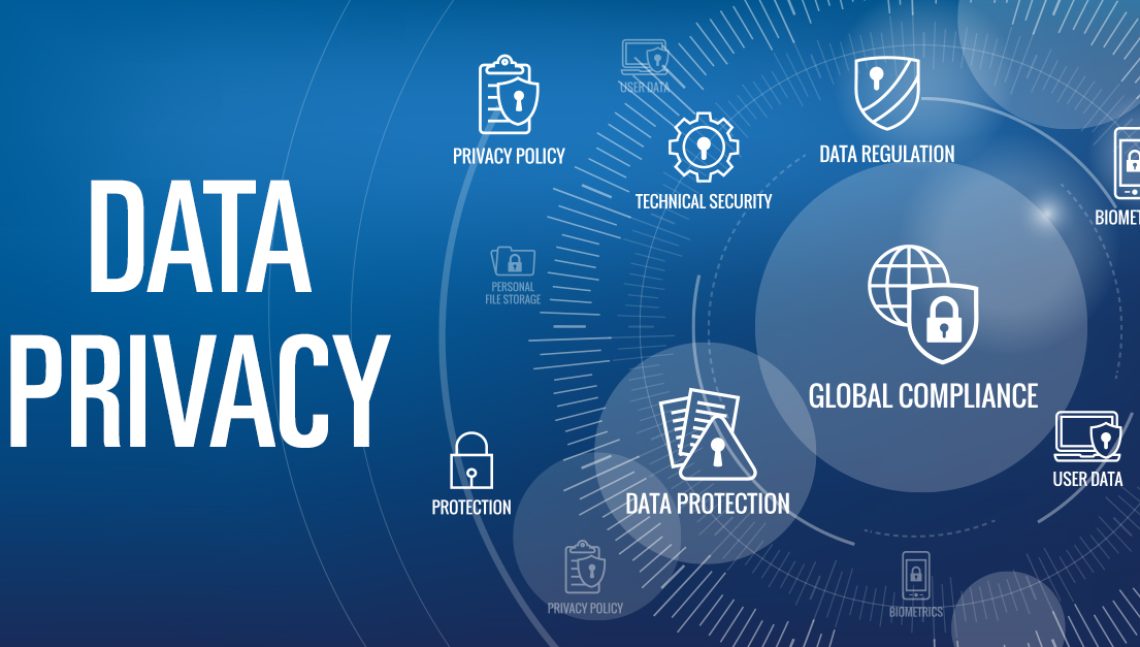Consumer data privacy has evolved significantly through 2024, with states enacting comprehensive privacy legislation following the precedents set by the California Consumer Privacy Act (CCPA) and Virginia’s Consumer Data Protection Act (VCDPA).
The amended California Consumer Privacy Act (CCPA), effective January 1, 2023, requires contractual terms between Businesses (Data Controllers) and Service Providers (Data Processors), as well as Businesses to Third Parties (Data Controllers).
Marketers face a complex web of regulations that vary by state and sector to strengthen data protection, enhance transparency, and provide consumer rights.
6 Key Consumer Data Privacy Rights
Across most jurisdictions, consumers now generally enjoy these fundamental rights:
- Right to Access: Consumers can request access to their personal data collected by businesses
- Right to Delete: The ability to request deletion of personal data
- Right to Correct: Consumers can request corrections to inaccurate personal information
- Right to Opt-Out: The ability to opt out of data collection, processing, share, or sell
- Right to Data Portability: Consumers can request their data in a portable format
- Right to Non-Discrimination: Protection against discrimination for exercising privacy rights
Consumer Data Privacy Laws


Sensitive Personal Data Restrictions by State
Businesses that operate in multiple states must comply with the privacy laws of each state. Many state privacy laws address sensitive data, which is personal information that could pose a risk if lost or disclosed without consent.

Retail Marketing Challenges:
Retail marketers are experiencing significant adjustments as they adapt to the new privacy regulations. Enhanced consent requirements have made it difficult to create detailed customer profiles, requiring retailers to develop new approaches to personalization and segmentation.
National retailers must navigate varying state requirements, creating additional operational overhead and compliance costs.
Updating legacy systems to meet new data handling requirements is a technical challenge particularly as point-of-sale systems must now integrate privacy preferences in real-time. This has become a factor in retail operations, requiring substantial investment in both infrastructure and training.
Nonprofit Sector Adaptations:
The nonprofit sector faces its own unique set of challenges while benefiting from certain exemptions under current privacy legislation. Organizations must implement stricter protocols for handling donor information, impacting their ability to maintain comprehensive supporter databases.
New restrictions on using personal data for fundraising campaigns have forced nonprofits to revise their outreach strategies and donor engagement approaches. Additionally, enhanced protection requirements for volunteer data have added another layer of complexity to volunteer management systems.
Nonprofits operating across multiple states face the added challenge of managing varying privacy requirements across different jurisdictions, requiring careful attention to compliance in each location where they maintain a presence.
Technical Implementation Challenges:
1. Data Mapping Requirements
- Maintain detailed records of data flows
- Regular audits of data processing activities required
- Implementation of data discovery tools
- Integration of privacy impact assessments
2. Consent Management
- Development of consent management platforms
- Implementation of preference centers
- Regular consent refresh requirements
- Implement a site opt-in consent mechanism to block the collection of personal data via device tracking technologies, until a site visitor has opted in
- Prominently display a notice that personal data collected from a visitor is for targeted advertising purposes
Operational Considerations:
1. Staff Training
- Regular privacy awareness training required
- Documentation of training completion
- Updates to training materials as laws change
2. Vendor Management
- Enhanced due diligence requirements
- Regular vendor audits
- Updated contractual requirements
- Monitoring of vendor compliance
Recommended Actions:
1. Regular Privacy Impact Assessments
- Conduct assessments at least quarterly
- Document findings and actions
- Remediation plans
- Monitor effectiveness of controls
2. Enhanced Documentation
- Maintain detailed processing records
- Document compliance procedures
- Keep consent records updated
- Track privacy metric improvements
3. Technology Updates
- Implement privacy-enhancing technologies
- Update security measures
As we progress through 2025, additional states will be implementing comprehensive privacy legislation and technical standards will advance. Enforcement of these laws will increase, with regulatory bodies imposing significant penalties for non-compliance.
Growing consumer awareness of privacy rights is leading to more frequent exercise of these rights and heightened expectations for data protection. Organizations that fail to adapt to these changes risk not only regulatory penalties but also damage to reputation and loss of consumer trust.
Anchor follows all consumer privacy rights as required by law and offers greater flexibility and precision in data quality, hygiene, and analysis. We function as data controllers for two key types of personal data: data licensed to clients and data used for identity resolution and targeted advertising services.
Our personal data sets are built from three primary sources: direct consumer interactions, public records, and authorized data partner relationships. We license these data assets to support marketing and analytics activities, while also using them to power our identity resolution services and deliver targeted advertising solutions. Contact us at (800) 452-2357 for more information.


